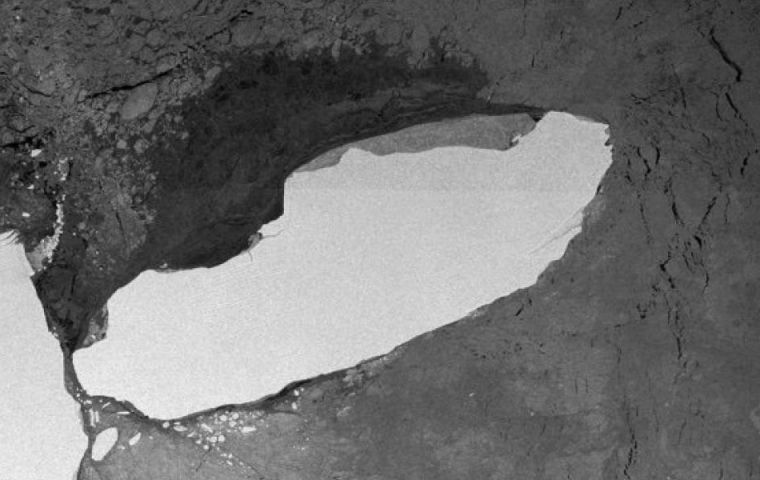MercoPress. South Atlantic News Agency
Giant iceberg “A68” takes off from Antarctica mainland to the Southern Ocean
 The A68 iceberg is the sixth-largest ever recorded, according to a NASA-ESA database, weighs an estimated trillion tons
The A68 iceberg is the sixth-largest ever recorded, according to a NASA-ESA database, weighs an estimated trillion tons A large iceberg in Antarctica has calved off the Larsen C ice shelf as of July last year and budged only a little from the coast until recently. In the past two months, the iceberg, known as 'A68', has taken a drastic 90 degree swing away from the Antarctic mainland and into the Southern Ocean.
The A68 iceberg is the sixth-largest ever recorded, according to a NASA-ESA database, weighs an estimated trillion tons.
Not only is this state-sized chuck of polar ice on the move – it has enough momentum to stay moving for months to come, in the view of Mark Brandon, a renowned Oceanographer at the Open University. He bases this claim on temperature data from the Suomi NPP satellite.“
”I should think we will see some interesting collisions with the ice shelf in the next few months,” Brandon wrote on his website.
As for what got the iceberg moving to start with, glaciologist Martin O’Leary, who studies A68 as part of the MIDAS Project, thinks it could have been winds, currents or even just a natural process.
“It might have been shaken loose by winds or ocean currents, or it might be that the natural thinning process (from both melting and the flow of the ice) has lifted the bottom of the iceberg off the seabed,” O'Leary said.
“Looks like the berg is now a lot more free to move about, so it will probably continue to rotate, and move out to sea.”
While some experts, Brandon included, think a collision with the Larson ice shelf is on the cards, marine ecologists are otherwise occupied by possibilities in the newly-vacated patch of ocean.
After a large chunk of ice breaks away, sunlight, plankton and fish take over and transform the ecosystem pretty quickly, marine biologist Phil Trathan explained to Live Science last year.
”It will be sort of a chain reaction. As you get productivity happening then you’ll get more species coming in, and so there will be quite significant changes over relatively short time scales.”
Courtesy of an international agreement, the area will be off-limits for any commercial operations – fishing included – for two years at the least




Top Comments
Disclaimer & comment rulesCommenting for this story is now closed.
If you have a Facebook account, become a fan and comment on our Facebook Page!